I'm going to have my brother Jeff review this for the GamerDad.com site!
Pokemon Mystery Dungeon: Gates to Infinity Review
|
|
See PixlBit's Review Policies

On 04/09/2013 at 03:00 PM by Nick DiMola It's probably best to keep games with "Mystery Dungeon" in the title away from Nick. |

Not Recommended.
Mystery Dungeon. Seeing those two words in succession are enough to make me cringe. For years now, Chunsoft has been developing this series of roguelikes across different licenses, with Pokemon Mystery Dungeon: Gates to Infinity marking the third in the respective subseries. No matter how they seem to spin this core concept, I simply can’t build an appreciation for it. While it tries to cater to a wider audience by removing the “hunger” facet and dialing down the difficulty, it’s still possible given its random nature to have the odds stacked so highly against you that there’s no chance for success.
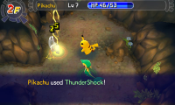
From what I understand, this is part of the appeal of this sub-genre. The random nature of the levels builds a sense of suspense and forces thoughtful preparation, planning, and of course, grinding to ensure success along the course of the game. Poor performance might mean having to redo a dungeon, but thanks to the persistence of your experience or level, incremental building of your characters can be accomplished. In Gates to Infinity the stakes for death aren’t extremely high (a common feature in roguelikes), but it will necessitate replaying entire dungeons or sections of dungeons in order to progress the story.
While for most players the consequences of death being lowered is a real boon, I found that they still weren’t low enough. Having to replay sections of the dungeons was more torturous than losing gear or items could ever be.
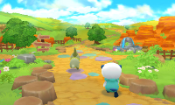
For one, most of the experience within a dungeon is extremely tedious. You encounter a very small variety of wild Pokemon to do battle against, so your tactics remain fairly consistent. One enemy may be vulnerable to your fire attacks, while another will be weak to a physical attack. Once you build these associations in your head, it’s just a matter of pushing the right buttons when you engage them on the open grid of the randomly generated floor.
Accompanying you on your travels is at least one friendly AI (though more join you on the field as the game progresses), who typically acts without much rhyme or reason. At best, they’ll actually lend you a little assistance in taking down enemy Pokemon, but more frequently they either do next to nothing, or actually assist the enemy by buffing them through use of improper moves. Pikachu saw fit to consistently electrify one given Pokemon type over and over and over despite the fact that with each execution of the move he enhanced their agility and strength.
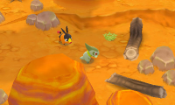
You are given the ability to micromanage their actions, but it’s not likely something you’re going to want to put the time into as brute force methodologies are usually enough to get the job done.
Outside of combing the floors for a set of stairs, Gates to Infinity doesn’t ask much of players. There are almost no stats to manage, especially with the removal of deteriorating hunger. This means that it’s even easy to rebuild health by simply finding a safe spot and holding A + B until your health refills, as nothing else will deplete in the process.
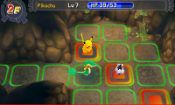
Regardless, you won’t often have to perform this function because the dungeon floors are quite large and labyrinthine, which means that just by virtue of walking around you’ll refill your health before spotting the stairs to the next floor. What’s most frustrating is grinding through one of these horrendously boring dungeons and spawning on the next floor amidst a huge group of enemies. In these instances, it’s very easy to become overwhelmed and die (or be forced to escape, if you have the proper item on hand). This necessitates going through the same grind once again to get back to where you were before, and beyond.
Of course, given the random nature of the dungeons, much of the experience is homogenous, with only the Pokemon and aesthetics changing from dungeon to dungeon. Whether you’re grinding through the same dungeon again, or moving on to another, the experience doesn’t grow any more interesting.
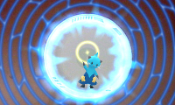
If nothing more, Pokemon Mystery Dungeon: Gates to Infinity is crushingly boring. This applies equally to the mundane and vapid dialog that’s not only unskippable, but in great volume when not in a dungeon. I spent entire lunch breaks just reading through the intolerable interactions between Pokemon over some current event within the game. If the gameplay wasn’t enough to drive you batty, the dialog is sure to do it.
While I don’t have a particularly good compass to direct what makes a good roguelike, this assuredly doesn’t seem like one. Even within the randomness that defines this subgenre, I’m sure certain algorithmic rules are applied in the better ones to ensure that dungeons are at least remotely interesting and enemies are placed more strategically about them. In an effort to make this niche genre more accessible, it seems Chunsoft has effectively alienated both fans and dissuaded potential newcomers with its poor implementation.








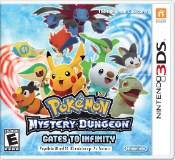

Comments